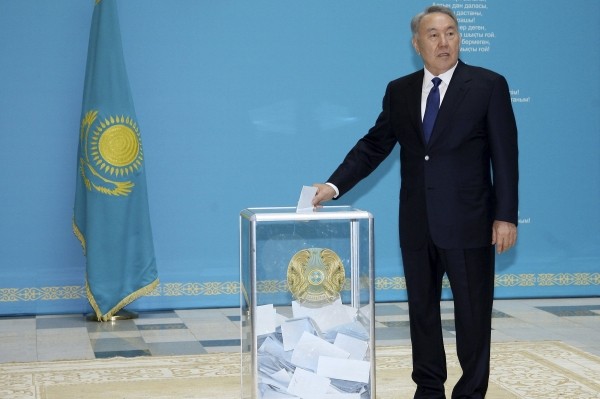 Standing against the current president of Kazakhstan could not, by any measure, be considered a good career move.
Standing against the current president of Kazakhstan could not, by any measure, be considered a good career move.
Since Nursultan Nazarbayev took power just before the country gained its independence during the break-up of the Soviet Union, a significant number of opposition leaders and even former allies have either been jailed or shot dead.
Happily for Nazarbayev, the misfortunes of his political opponents mean that his Nur Otan party dominates the parliament so that government policies are passed unopposed.
Despite this, Nazarbayev is taking no chances and has called a snap election for March 20 which analysts believe will allow the 75-year-old to cling on to power before the slump in oil prices and the economy causes widespread discontent.
The parliamentary elections were originally expected early in 2017 or late this year but Nazarbayev has made a habit of calling early elections, none of which have ever been regarded as free or fair by independent observers.
WHY ARE THEY BEING HELD SO EARLY?
IF OIL prices plunge even further, it could severely damage Kazakhstan’s economy, making it tougher for the presidents’ allies to keep their present control over the legislature.
“Our people, as always, need to unite and rebuff, by means of lawmaking if needed, any potential provocations at this hard time. And (also rebuff) those who try to politicise and seek culprits for the situation worsening,” said the president’s spokesman.
Oil is the Central Asian nation’s biggest export and the fall in price has led to a nearly 50 per cent drop against the dollar for Kazakhstan’s tenge currency.
To offset this, the government increased public-sector salaries by up to 40 per cent and raised pensions by nine per cent.
“In line with tradition, elections are being held early in order to take advantage of the effect from increased public-sector payouts,” said analyst Aidos Sarym. “The economic situation will worsen in the future and the authorities will not be able to achieve the desired result without excessive strain.”
Holding an election campaign during the bitter winter months, when temperatures can plummet below -40 Celsius, is also expected to dampen voters’ enthusiasm for any opposition rallies.
WHAT ABOUT RUSSIA?
A VAST country, equivalent in size to Western Europe, Kazakhstan has enormous mineral resources and economic potential. However its proximity to Russia has resulted in a turbulent and violent history over the last few centuries. Invasions from the Mongols led to the nomadic Kazaks seeking help from Russia which they later came to regret when thousands of Ukranians and Russians were transported to Kazakhstan to take over lands and set up factories at the end of the 19th century.
In 1916, 150,000 people were killed and more than 300,000 fled abroad during an anti-Russian rebellion. The country became an autonomous republic of the USSR in 1920, suffering during the collectivisation of agriculture. More than one million people died of starvation during this period.
In 1936, Kazakhstan became a full union republic of the Soviet Union and during the Second World War hundreds and thousands of Crimean Tartars, Germans and Koreans were moved forcibly to the area.
As well as a dumping ground for unwanted residents, Soviet leaders also saw Kazakhstan as the ideal place for nuclear tests with the first explosion detonated at the Semipalatinsk ground in the east of the country in 1949.
WHAT IS THE PRESIDENT’S RECORD?
THE son of Kazakhstan peasants, Nazarbayev worked as a steelworker and joined the Communist Party of the Soviet Union in 1962. He rose through the ranks and in 1990 the Supreme Soviet made him the first president of Kazakhstan. The country gained its independence a year after and Nazarbayev won the uncontested presidential election.
While Nazarbayev was happy to make the country nuclear free, Kazakhstan has been left to deal with the aftermath of nuclear testing and the dumping of toxic waste together with the drastic shrinkage of the severely polluted Aral Sea as a result of misguided Soviet irrigation projects.
The introduction of privatisation by Nazarbayev led to a few people becoming very rich at the expense of the rest. Opposition leaders maintain corruption is endemic.
WHY DON’T PEOPLE PROTEST?
OIL has helped raise employment levels and standards of living throughout this century but there is growing drug addiction and the current fall in oil price is increasing discontent.
However with tight constraints on the media there are few ways this discontent can be expressed.
One journalist and critic of Nazarbayev, Sergey Duvanov, was accused of raping a minor and jailed after what human rights activists say was a flawed trial and attempt to silence the media.
Opposition figures Zamanbek Nurkadilov andAltynbek Sarsenbayev were found shot dead in 2005 and 2006 respectively while others have been jailed or barred from standing for election. The now exiled Rakhat Aliyev was fired by his father-in-law, the president, in a power struggle and has been found guilty of plotting a coup and sentenced to 20 years in prison.
Amnesty International, meanwhile, claims that security firms continue to torture people.
Last year, the president was re-elected with 97.7 per cent of the votes cast but the opposition parties did not put up any candidates and the two others vying for the post were seen as pro-government.
No surprises are expected on March 20
The National, 6.03.2016




